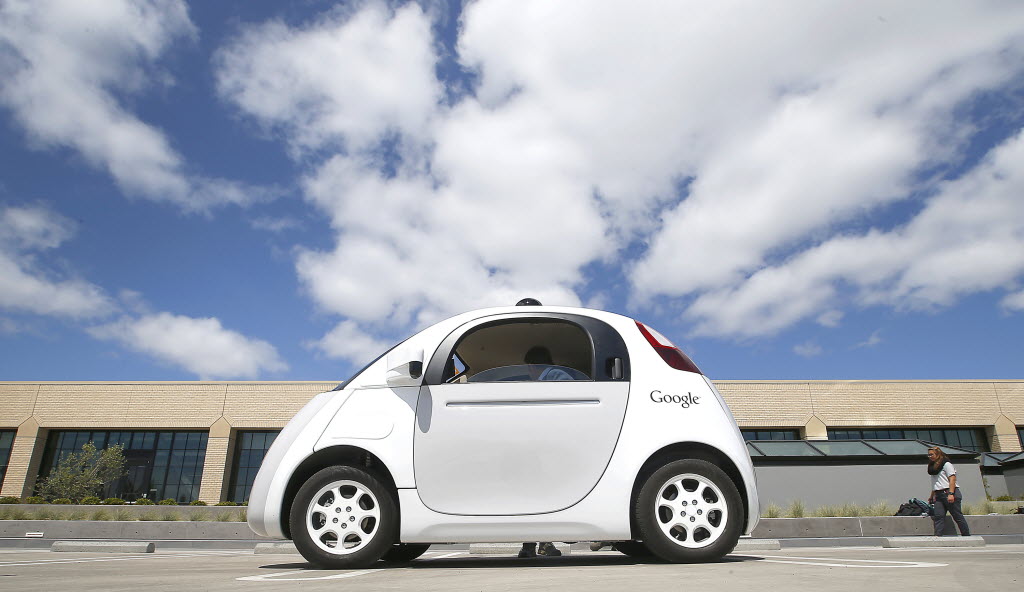SAN FRANCISCO — Federal auto safety and standards regulators should set rules governing self-driving cars — not state agencies that may not have the technological know-how to assess the rapidly evolving technology.
That was the message delivered to federal administrators Wednesday by Chris Urmson, the chief architect of Google's seven-year-old autonomous car program.
Urmson was one of a variety of auto experts speaking at a Stanford University forum organized by the National Highway Traffic Safety Administration, which is soliciting comments as it aims to establish guidelines later this summer for companies developing autonomous cars.
The event took place the day after Google announced it was part of the Self-Driving Coalition for Safer Streets, a lobbying group of autonomous-car focused companies that also includes Ford, Lyft, Uber and Volvo. The group is being led by former NHTSA administrator David Strickland.
Strickland will be lobbying his former agency, which has been tasked by Department of Transportation head Anthony Foxx with creating the new rules.
Last fall, concern over a lack of such guidelines led Volvo Cars CEO Hakan Samuelsson to caution that "the absence of one set of rules means carmakers cannot conduct credible tests to develop cars that meet all the different guidelines of all 50 U.S. states."
Google's Urmson told those gathered at the public meeting that his company has watched "15 states propose bespoke laws over the last 12 months, all of which have a different scope and different definitions. Vehicle-safety standards are not the expertise of the states, and expecting them to take on this role will only lead to inconsistent safety requirements. ... We would like NHTSA to be the expert authority for the nation on this issue."
Google cars have already logged more than a million miles in testing in Kirkland, Wash.; Phoenix; Austin; and around its corporate headquarters in Mountain View, Calif.
The company's interest in having a federal agency take charge is set against the backdrop of draft legislation proposed by the California Department of Motor Vehicles that could potentially require all self-driving cars operating on public roads in the state to be equipped with a steering wheel and pedals.
While Google's fleet of self-driving Lexus SUVs has them, the company's prototype two-person people mover would lack both in a production version.
Self-driving car technology is maturing at a rapid pace, thanks to tech and auto companies alike pushing hard into the space. For the most part, what's being developed is an array of driver-assist technology that takes over for certain tasks. A case in point is Tesla's Autopilot features, which allow the electric car to stay in a lane or safely change lanes itself if the driver flicks the blinker.
But despite such progress, for autonomous cars to become a national phenomenon there has to be a cohesive set of rules and regulations governing the technology, or else a self-driving car leaving one state could suddenly find itself banned in the next. Also yet to be discussed are the insurance issues that would govern accidents and injuries caused by self-driving cars.
Autonomous cars also are facing a public relations battle. A March poll by AAA concluded that 75% of respondents were afraid of self-driving vehicles.
Urmson has long made the case that whatever errors a self-driving car may make — and to date, only once has a Google car caused an accident, a small fender bender — that's a small price to pay for what he says will be a huge reduction in the 33,000 auto deaths that occur annually due to human driver error.
“We believe that our country cannot go slow on safety," Urmson told federal officials. "Despite the progress made, our roads are still unsafe for people. Ninety people die on U.S. streets every day due to motor vehicle accidents, and that number increased by about 8% in 2015 alone. The concern should not be that (autonomous car) technology comes too soon, but that it comes too late.”
Follow USA TODAY tech reporter Marco della Cava on Twitter: @marcodellacava

![Experts: Self-Driving Cars Not Ready for Roads [video : 83610642]](http://videos.usatoday.net/Brightcove2/29906170001/2016/04/29906170001_4866255416001_thumb-db2dcd7361654b15970f6a706700827c.jpg?pubId=29906170001)

